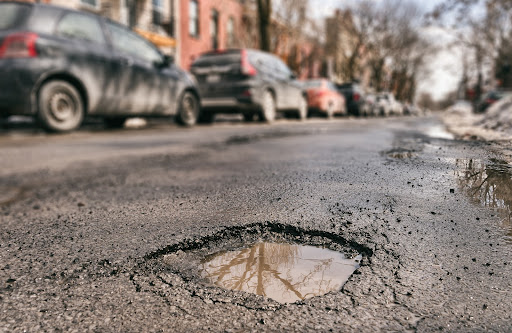
Potholes are a common problem in cities, towns, and even commercial properties. But, how do potholes form anyway?
Before you can understand how potholes form, you must first know their definition. What is a pothole? Simply put, a pothole is a natural cavity on the ground or surface. It is something that most people will encounter at least once in their lifetime.
Potholes are an eyesore. They make any neighborhood or commercial property look instantly appalling and inadequate. They signal to people that the place is poorly maintained and that whoever’s in charge isn’t doing a very good job.
But, apart from their bad appearance, potholes also pose a danger to drivers, passengers, and pedestrians. When you drive over a large pothole, it can cause the car to jump, leading to possible injury. Potholes can also deal significant damage to a vehicle’s shocks and struts over time. As for pedestrians, they can trip over them and hurt themselves.
Potholes not only indicate substandard management but can also negatively impact the reputation of a business or neighborhood. Additionally, potholes can make you vulnerable to liability because they can cause damage and injury.
But, how are potholes formed in the first place? What process creates potholes?
Potholes form as a result of water. When water accumulates, which usually happens in the winter (snow and ice), it can seep into the ground and erode the sub-base. In cold temperatures, water will freeze and expand below the surface, causing the surrounding material to expand. Once the ice melts, it leaves a huge gap underneath.
This continuous cycle of freezing and thawing will weaken the surface and leave cracks. And, because the surface is already weak, vehicles that pass over it will cause it to break, forming potholes.
Potholes that form in pavements go through the same process as explained above. When groundwater finds its way underneath the pavement and freezes, it expands and causes cracks. Once it melts, it leaves a void and makes it weak. The weight of cars, motorcycles, bicycles, and pedestrians only adds to the burden, eventually forming potholes.
When you analyze how potholes form, there are three factors that contribute to the process – water, temperature, and traffic.
Water is the primary factor that causes potholes to form. Without water, nothing will seep into the ground and underneath the surface. Water is the substance that expands and contracts the asphalt or pavement, leading to swelling, bending, and cracking.
How does water find its way below the ground? That’s easy – the weather. When it rains, water can accumulate and trickle underneath the surface.
The second contributing factor is temperature. Water alone can’t do immediate damage. It needs freezing temperatures to solidify and expand the pavement. When water freezes, it causes the material to swell and crack.
Temperature again comes in for the next step in the process. When the temperature goes up, ice melts. This leads to the frozen water underneath the surface melting and leaving a gap. Because of this, potholes are more likely to form when there is a combination of water and fluctuating temperatures.
The final factor that leads to potholes is traffic. This refers to both vehicle and pedestrian traffic, though the former does quicker and more damage than the latter. The weight of trucks, vans, and cars passing over the weakened spot will cause it to break open. The more vehicles pass by and the more frequently they do, the faster potholes will form.
Now that you know what causes potholes, you must understand why it is essential to repair them as soon as possible. As previously explained, potholes are safety hazards. They can injure people and damage vehicles. Moreover, they give off a bad appearance.
Beyond those reasons, it is important to repair potholes immediately to avoid further damage. If you ignore a small pothole, it can turn into a big one. Worse yet, it can expand and cause more potholes to form. Because there is already an existing pothole, water can more easily get underground.
In addition, when you repair potholes as soon as possible, you save more money in the long run. Sure, pothole repair requires you to spend money. But, if you allow the situation to worsen, the repairs will cost you more. If it gets to a point where you can’t repair the potholes anymore, you will need to replace the entire surface, which can cost a small fortune.
Another way pothole repair can save you money is by prolonging the pavement or asphalt surface lifespan. When you address potholes as they arise, you can prevent more potholes from forming. This will extend the longevity of the surface or pavement.
When you encounter a pothole, don’t try to remedy the problem yourself. If you don’t have experience repairing potholes, you may do more harm than good. As such, it is best to call a professional for pothole repair in North and South Carolina.
Professionals are great because they can do the job effectively and efficiently. They already know what to do and what materials to use. They also have access to commercial-grade equipment that can simplify the process and produce perfect results. Moreover, professional pothole repair technicians can usually come in when you want them to. This minimizes disruption to traffic or business operations.
Potholes result from water seeping underneath the surface, freezing temperatures, and heavy traffic. If you don’t want them interfering with your business, it is best to seek professional pothole repair in South Carolina and North Carolina. Doing so can save money and prevent more potholes from forming.
Pothole Repair Carolinas provides expert pothole repair services in addition to concrete services, puddle repair, sealcoating, striping, and more. Call us today at 704-227-0468 or contact us online to request a free quote!